A Literature Review on Unfair Dismissal in Australia for Employers
VerifiedAdded on 2023/06/11
|9
|2757
|361
Literature Review
AI Summary
This literature review examines the topic of unfair dismissal in Australia, focusing on the lessons employers can learn from relevant legislation and case law. It begins by outlining the historical context of unfair dismissal laws and the key provisions of the Fair Work Act 2009 (Cth). The review then analyzes several case studies, such as West v Holcim (Australia) Pty Ltd, Walker v Salvation Army, and Welsby v Artis Group Pty Ltd, to illustrate common pitfalls for employers, including failure to conduct thorough investigations, denying employees the opportunity to respond to allegations, and neglecting to provide adequate warnings about performance issues. The review emphasizes the importance of employers understanding their obligations under the law to avoid unfair dismissal claims and improve workplace practices. The document concludes by reiterating the significance of these lessons in protecting employee rights and fostering a fair and compliant work environment.
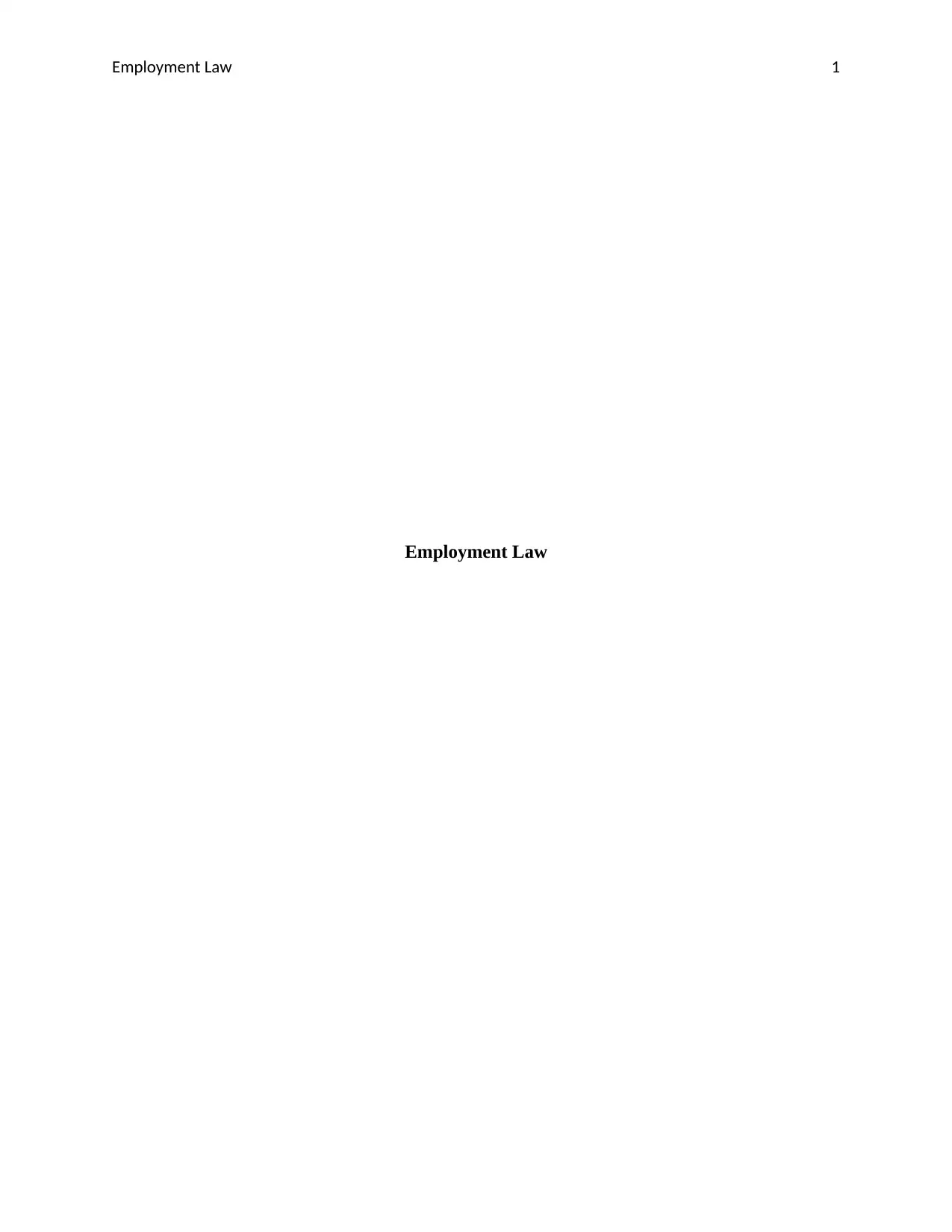
Employment Law 1
Employment Law
Employment Law
Paraphrase This Document
Need a fresh take? Get an instant paraphrase of this document with our AI Paraphraser
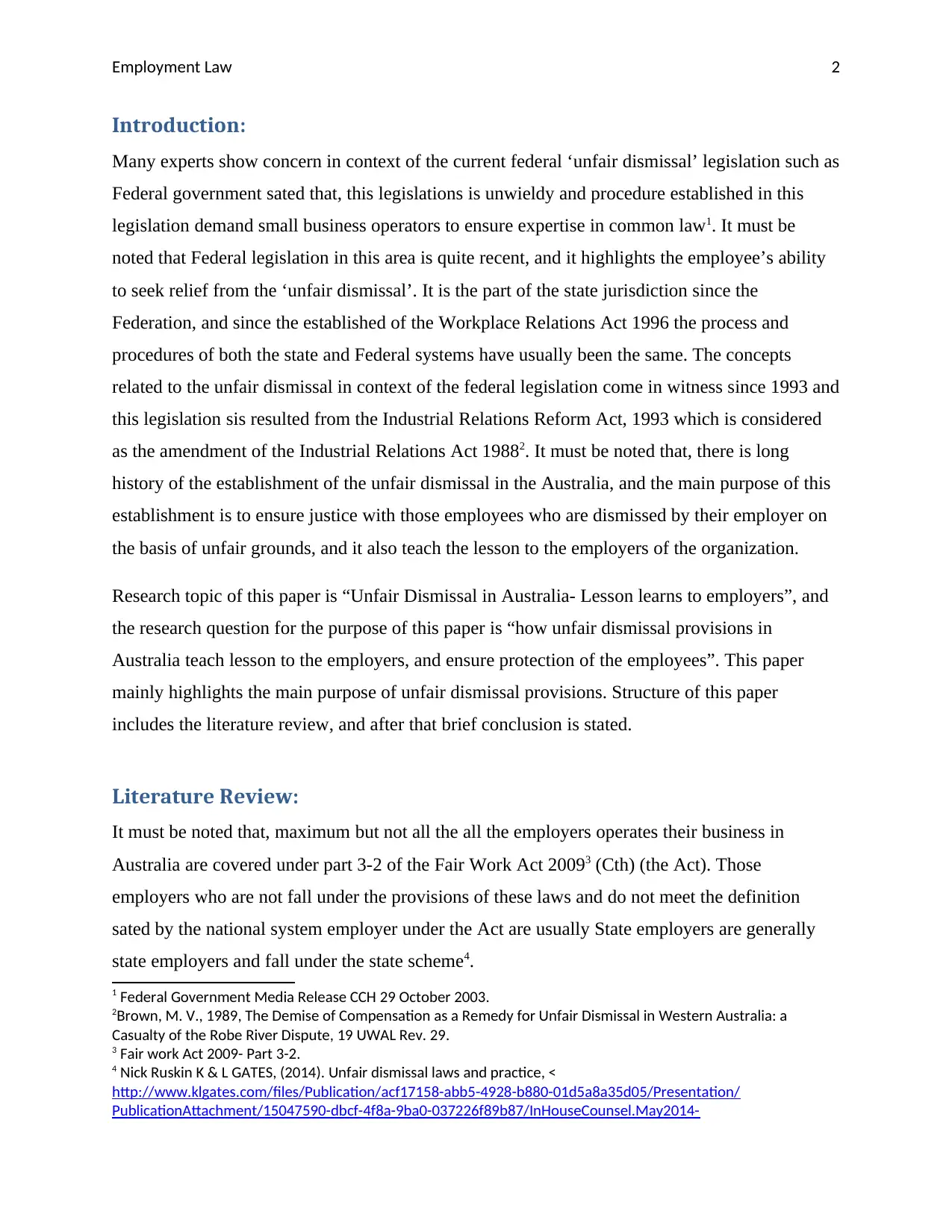
Employment Law 2
Introduction:
Many experts show concern in context of the current federal ‘unfair dismissal’ legislation such as
Federal government sated that, this legislations is unwieldy and procedure established in this
legislation demand small business operators to ensure expertise in common law1. It must be
noted that Federal legislation in this area is quite recent, and it highlights the employee’s ability
to seek relief from the ‘unfair dismissal’. It is the part of the state jurisdiction since the
Federation, and since the established of the Workplace Relations Act 1996 the process and
procedures of both the state and Federal systems have usually been the same. The concepts
related to the unfair dismissal in context of the federal legislation come in witness since 1993 and
this legislation sis resulted from the Industrial Relations Reform Act, 1993 which is considered
as the amendment of the Industrial Relations Act 19882. It must be noted that, there is long
history of the establishment of the unfair dismissal in the Australia, and the main purpose of this
establishment is to ensure justice with those employees who are dismissed by their employer on
the basis of unfair grounds, and it also teach the lesson to the employers of the organization.
Research topic of this paper is “Unfair Dismissal in Australia- Lesson learns to employers”, and
the research question for the purpose of this paper is “how unfair dismissal provisions in
Australia teach lesson to the employers, and ensure protection of the employees”. This paper
mainly highlights the main purpose of unfair dismissal provisions. Structure of this paper
includes the literature review, and after that brief conclusion is stated.
Literature Review:
It must be noted that, maximum but not all the all the employers operates their business in
Australia are covered under part 3-2 of the Fair Work Act 20093 (Cth) (the Act). Those
employers who are not fall under the provisions of these laws and do not meet the definition
sated by the national system employer under the Act are usually State employers are generally
state employers and fall under the state scheme4.
1 Federal Government Media Release CCH 29 October 2003.
2Brown, M. V., 1989, The Demise of Compensation as a Remedy for Unfair Dismissal in Western Australia: a
Casualty of the Robe River Dispute, 19 UWAL Rev. 29.
3 Fair work Act 2009- Part 3-2.
4 Nick Ruskin K & L GATES, (2014). Unfair dismissal laws and practice, <
http://www.klgates.com/files/Publication/acf17158-abb5-4928-b880-01d5a8a35d05/Presentation/
PublicationAttachment/15047590-dbcf-4f8a-9ba0-037226f89b87/InHouseCounsel.May2014-
Introduction:
Many experts show concern in context of the current federal ‘unfair dismissal’ legislation such as
Federal government sated that, this legislations is unwieldy and procedure established in this
legislation demand small business operators to ensure expertise in common law1. It must be
noted that Federal legislation in this area is quite recent, and it highlights the employee’s ability
to seek relief from the ‘unfair dismissal’. It is the part of the state jurisdiction since the
Federation, and since the established of the Workplace Relations Act 1996 the process and
procedures of both the state and Federal systems have usually been the same. The concepts
related to the unfair dismissal in context of the federal legislation come in witness since 1993 and
this legislation sis resulted from the Industrial Relations Reform Act, 1993 which is considered
as the amendment of the Industrial Relations Act 19882. It must be noted that, there is long
history of the establishment of the unfair dismissal in the Australia, and the main purpose of this
establishment is to ensure justice with those employees who are dismissed by their employer on
the basis of unfair grounds, and it also teach the lesson to the employers of the organization.
Research topic of this paper is “Unfair Dismissal in Australia- Lesson learns to employers”, and
the research question for the purpose of this paper is “how unfair dismissal provisions in
Australia teach lesson to the employers, and ensure protection of the employees”. This paper
mainly highlights the main purpose of unfair dismissal provisions. Structure of this paper
includes the literature review, and after that brief conclusion is stated.
Literature Review:
It must be noted that, maximum but not all the all the employers operates their business in
Australia are covered under part 3-2 of the Fair Work Act 20093 (Cth) (the Act). Those
employers who are not fall under the provisions of these laws and do not meet the definition
sated by the national system employer under the Act are usually State employers are generally
state employers and fall under the state scheme4.
1 Federal Government Media Release CCH 29 October 2003.
2Brown, M. V., 1989, The Demise of Compensation as a Remedy for Unfair Dismissal in Western Australia: a
Casualty of the Robe River Dispute, 19 UWAL Rev. 29.
3 Fair work Act 2009- Part 3-2.
4 Nick Ruskin K & L GATES, (2014). Unfair dismissal laws and practice, <
http://www.klgates.com/files/Publication/acf17158-abb5-4928-b880-01d5a8a35d05/Presentation/
PublicationAttachment/15047590-dbcf-4f8a-9ba0-037226f89b87/InHouseCounsel.May2014-
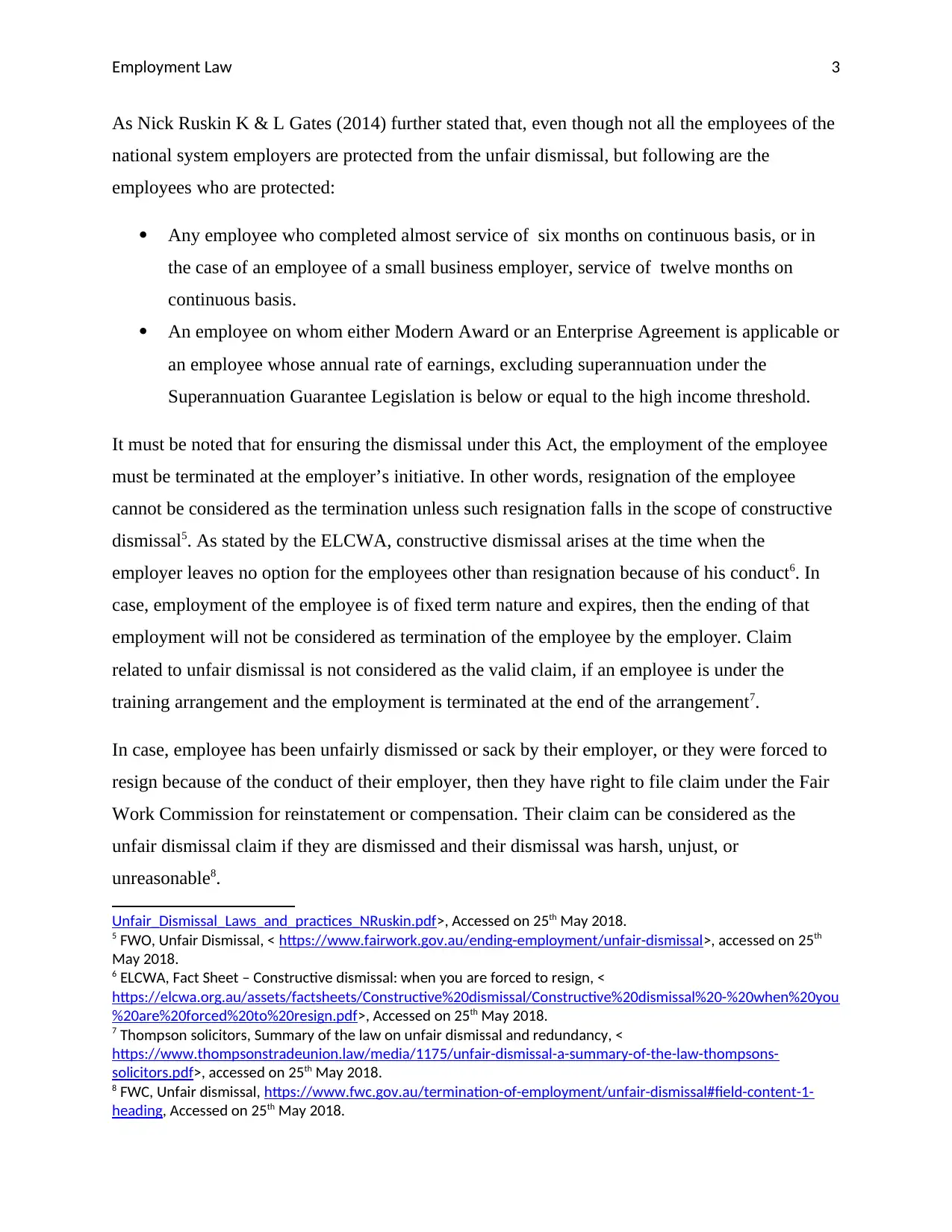
Employment Law 3
As Nick Ruskin K & L Gates (2014) further stated that, even though not all the employees of the
national system employers are protected from the unfair dismissal, but following are the
employees who are protected:
Any employee who completed almost service of six months on continuous basis, or in
the case of an employee of a small business employer, service of twelve months on
continuous basis.
An employee on whom either Modern Award or an Enterprise Agreement is applicable or
an employee whose annual rate of earnings, excluding superannuation under the
Superannuation Guarantee Legislation is below or equal to the high income threshold.
It must be noted that for ensuring the dismissal under this Act, the employment of the employee
must be terminated at the employer’s initiative. In other words, resignation of the employee
cannot be considered as the termination unless such resignation falls in the scope of constructive
dismissal5. As stated by the ELCWA, constructive dismissal arises at the time when the
employer leaves no option for the employees other than resignation because of his conduct6. In
case, employment of the employee is of fixed term nature and expires, then the ending of that
employment will not be considered as termination of the employee by the employer. Claim
related to unfair dismissal is not considered as the valid claim, if an employee is under the
training arrangement and the employment is terminated at the end of the arrangement7.
In case, employee has been unfairly dismissed or sack by their employer, or they were forced to
resign because of the conduct of their employer, then they have right to file claim under the Fair
Work Commission for reinstatement or compensation. Their claim can be considered as the
unfair dismissal claim if they are dismissed and their dismissal was harsh, unjust, or
unreasonable8.
Unfair_Dismissal_Laws_and_practices_NRuskin.pdf>, Accessed on 25th May 2018.
5 FWO, Unfair Dismissal, < https://www.fairwork.gov.au/ending-employment/unfair-dismissal>, accessed on 25th
May 2018.
6 ELCWA, Fact Sheet – Constructive dismissal: when you are forced to resign, <
https://elcwa.org.au/assets/factsheets/Constructive%20dismissal/Constructive%20dismissal%20-%20when%20you
%20are%20forced%20to%20resign.pdf>, Accessed on 25th May 2018.
7 Thompson solicitors, Summary of the law on unfair dismissal and redundancy, <
https://www.thompsonstradeunion.law/media/1175/unfair-dismissal-a-summary-of-the-law-thompsons-
solicitors.pdf>, accessed on 25th May 2018.
8 FWC, Unfair dismissal, https://www.fwc.gov.au/termination-of-employment/unfair-dismissal#field-content-1-
heading, Accessed on 25th May 2018.
As Nick Ruskin K & L Gates (2014) further stated that, even though not all the employees of the
national system employers are protected from the unfair dismissal, but following are the
employees who are protected:
Any employee who completed almost service of six months on continuous basis, or in
the case of an employee of a small business employer, service of twelve months on
continuous basis.
An employee on whom either Modern Award or an Enterprise Agreement is applicable or
an employee whose annual rate of earnings, excluding superannuation under the
Superannuation Guarantee Legislation is below or equal to the high income threshold.
It must be noted that for ensuring the dismissal under this Act, the employment of the employee
must be terminated at the employer’s initiative. In other words, resignation of the employee
cannot be considered as the termination unless such resignation falls in the scope of constructive
dismissal5. As stated by the ELCWA, constructive dismissal arises at the time when the
employer leaves no option for the employees other than resignation because of his conduct6. In
case, employment of the employee is of fixed term nature and expires, then the ending of that
employment will not be considered as termination of the employee by the employer. Claim
related to unfair dismissal is not considered as the valid claim, if an employee is under the
training arrangement and the employment is terminated at the end of the arrangement7.
In case, employee has been unfairly dismissed or sack by their employer, or they were forced to
resign because of the conduct of their employer, then they have right to file claim under the Fair
Work Commission for reinstatement or compensation. Their claim can be considered as the
unfair dismissal claim if they are dismissed and their dismissal was harsh, unjust, or
unreasonable8.
Unfair_Dismissal_Laws_and_practices_NRuskin.pdf>, Accessed on 25th May 2018.
5 FWO, Unfair Dismissal, < https://www.fairwork.gov.au/ending-employment/unfair-dismissal>, accessed on 25th
May 2018.
6 ELCWA, Fact Sheet – Constructive dismissal: when you are forced to resign, <
https://elcwa.org.au/assets/factsheets/Constructive%20dismissal/Constructive%20dismissal%20-%20when%20you
%20are%20forced%20to%20resign.pdf>, Accessed on 25th May 2018.
7 Thompson solicitors, Summary of the law on unfair dismissal and redundancy, <
https://www.thompsonstradeunion.law/media/1175/unfair-dismissal-a-summary-of-the-law-thompsons-
solicitors.pdf>, accessed on 25th May 2018.
8 FWC, Unfair dismissal, https://www.fwc.gov.au/termination-of-employment/unfair-dismissal#field-content-1-
heading, Accessed on 25th May 2018.
⊘ This is a preview!⊘
Do you want full access?
Subscribe today to unlock all pages.

Trusted by 1+ million students worldwide
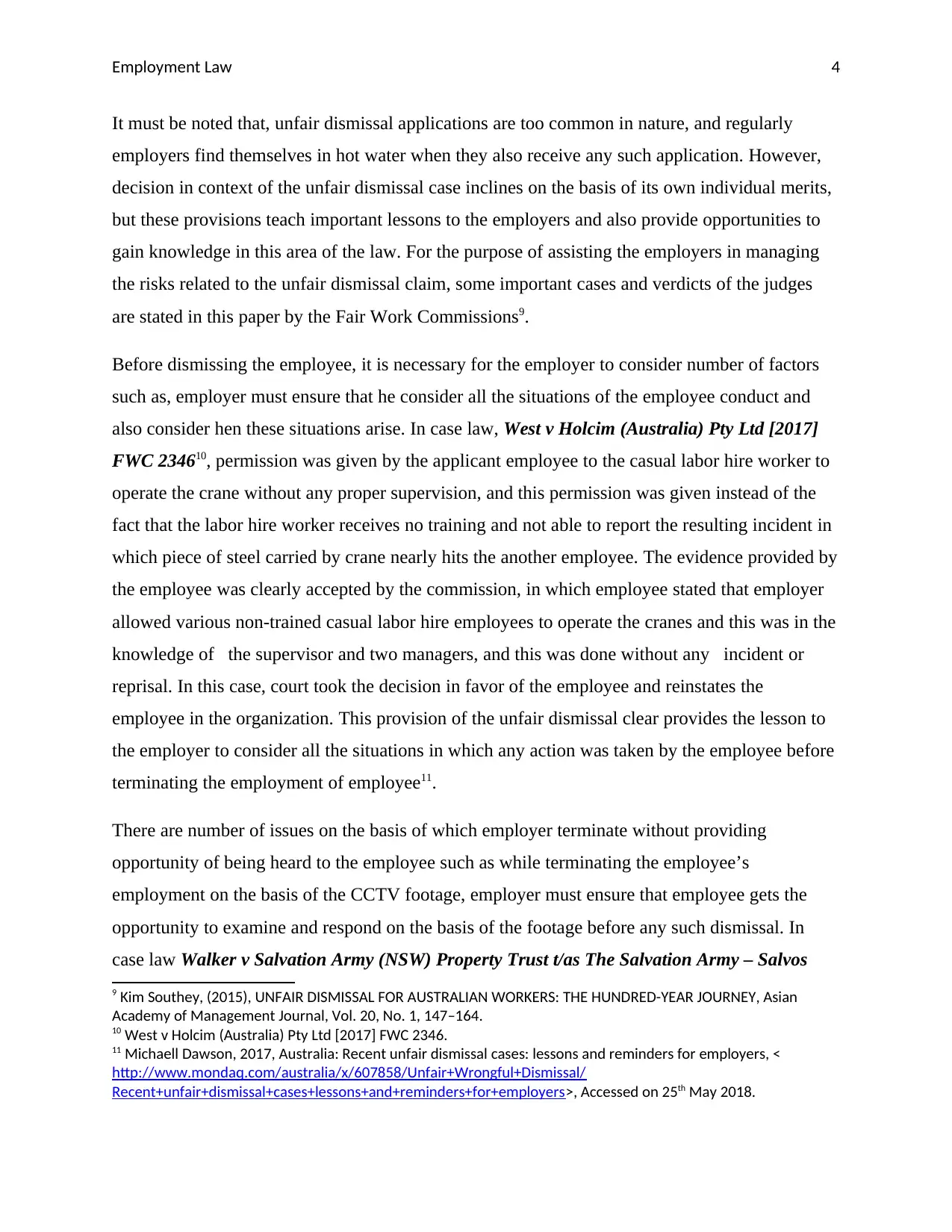
Employment Law 4
It must be noted that, unfair dismissal applications are too common in nature, and regularly
employers find themselves in hot water when they also receive any such application. However,
decision in context of the unfair dismissal case inclines on the basis of its own individual merits,
but these provisions teach important lessons to the employers and also provide opportunities to
gain knowledge in this area of the law. For the purpose of assisting the employers in managing
the risks related to the unfair dismissal claim, some important cases and verdicts of the judges
are stated in this paper by the Fair Work Commissions9.
Before dismissing the employee, it is necessary for the employer to consider number of factors
such as, employer must ensure that he consider all the situations of the employee conduct and
also consider hen these situations arise. In case law, West v Holcim (Australia) Pty Ltd [2017]
FWC 234610, permission was given by the applicant employee to the casual labor hire worker to
operate the crane without any proper supervision, and this permission was given instead of the
fact that the labor hire worker receives no training and not able to report the resulting incident in
which piece of steel carried by crane nearly hits the another employee. The evidence provided by
the employee was clearly accepted by the commission, in which employee stated that employer
allowed various non-trained casual labor hire employees to operate the cranes and this was in the
knowledge of the supervisor and two managers, and this was done without any incident or
reprisal. In this case, court took the decision in favor of the employee and reinstates the
employee in the organization. This provision of the unfair dismissal clear provides the lesson to
the employer to consider all the situations in which any action was taken by the employee before
terminating the employment of employee11.
There are number of issues on the basis of which employer terminate without providing
opportunity of being heard to the employee such as while terminating the employee’s
employment on the basis of the CCTV footage, employer must ensure that employee gets the
opportunity to examine and respond on the basis of the footage before any such dismissal. In
case law Walker v Salvation Army (NSW) Property Trust t/as The Salvation Army – Salvos
9 Kim Southey, (2015), UNFAIR DISMISSAL FOR AUSTRALIAN WORKERS: THE HUNDRED-YEAR JOURNEY, Asian
Academy of Management Journal, Vol. 20, No. 1, 147–164.
10 West v Holcim (Australia) Pty Ltd [2017] FWC 2346.
11 Michaell Dawson, 2017, Australia: Recent unfair dismissal cases: lessons and reminders for employers, <
http://www.mondaq.com/australia/x/607858/Unfair+Wrongful+Dismissal/
Recent+unfair+dismissal+cases+lessons+and+reminders+for+employers>, Accessed on 25th May 2018.
It must be noted that, unfair dismissal applications are too common in nature, and regularly
employers find themselves in hot water when they also receive any such application. However,
decision in context of the unfair dismissal case inclines on the basis of its own individual merits,
but these provisions teach important lessons to the employers and also provide opportunities to
gain knowledge in this area of the law. For the purpose of assisting the employers in managing
the risks related to the unfair dismissal claim, some important cases and verdicts of the judges
are stated in this paper by the Fair Work Commissions9.
Before dismissing the employee, it is necessary for the employer to consider number of factors
such as, employer must ensure that he consider all the situations of the employee conduct and
also consider hen these situations arise. In case law, West v Holcim (Australia) Pty Ltd [2017]
FWC 234610, permission was given by the applicant employee to the casual labor hire worker to
operate the crane without any proper supervision, and this permission was given instead of the
fact that the labor hire worker receives no training and not able to report the resulting incident in
which piece of steel carried by crane nearly hits the another employee. The evidence provided by
the employee was clearly accepted by the commission, in which employee stated that employer
allowed various non-trained casual labor hire employees to operate the cranes and this was in the
knowledge of the supervisor and two managers, and this was done without any incident or
reprisal. In this case, court took the decision in favor of the employee and reinstates the
employee in the organization. This provision of the unfair dismissal clear provides the lesson to
the employer to consider all the situations in which any action was taken by the employee before
terminating the employment of employee11.
There are number of issues on the basis of which employer terminate without providing
opportunity of being heard to the employee such as while terminating the employee’s
employment on the basis of the CCTV footage, employer must ensure that employee gets the
opportunity to examine and respond on the basis of the footage before any such dismissal. In
case law Walker v Salvation Army (NSW) Property Trust t/as The Salvation Army – Salvos
9 Kim Southey, (2015), UNFAIR DISMISSAL FOR AUSTRALIAN WORKERS: THE HUNDRED-YEAR JOURNEY, Asian
Academy of Management Journal, Vol. 20, No. 1, 147–164.
10 West v Holcim (Australia) Pty Ltd [2017] FWC 2346.
11 Michaell Dawson, 2017, Australia: Recent unfair dismissal cases: lessons and reminders for employers, <
http://www.mondaq.com/australia/x/607858/Unfair+Wrongful+Dismissal/
Recent+unfair+dismissal+cases+lessons+and+reminders+for+employers>, Accessed on 25th May 2018.
Paraphrase This Document
Need a fresh take? Get an instant paraphrase of this document with our AI Paraphraser
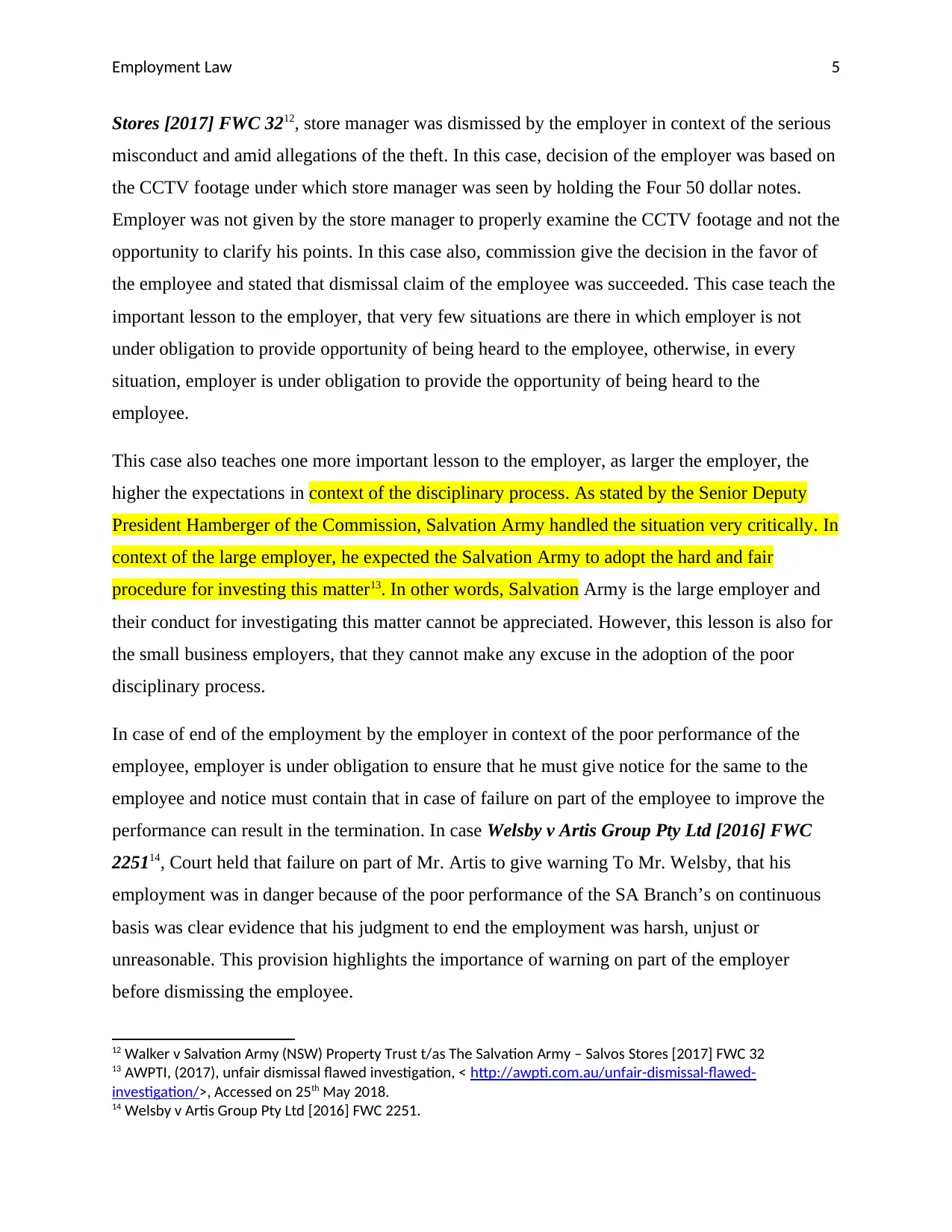
Employment Law 5
Stores [2017] FWC 3212, store manager was dismissed by the employer in context of the serious
misconduct and amid allegations of the theft. In this case, decision of the employer was based on
the CCTV footage under which store manager was seen by holding the Four 50 dollar notes.
Employer was not given by the store manager to properly examine the CCTV footage and not the
opportunity to clarify his points. In this case also, commission give the decision in the favor of
the employee and stated that dismissal claim of the employee was succeeded. This case teach the
important lesson to the employer, that very few situations are there in which employer is not
under obligation to provide opportunity of being heard to the employee, otherwise, in every
situation, employer is under obligation to provide the opportunity of being heard to the
employee.
This case also teaches one more important lesson to the employer, as larger the employer, the
higher the expectations in context of the disciplinary process. As stated by the Senior Deputy
President Hamberger of the Commission, Salvation Army handled the situation very critically. In
context of the large employer, he expected the Salvation Army to adopt the hard and fair
procedure for investing this matter13. In other words, Salvation Army is the large employer and
their conduct for investigating this matter cannot be appreciated. However, this lesson is also for
the small business employers, that they cannot make any excuse in the adoption of the poor
disciplinary process.
In case of end of the employment by the employer in context of the poor performance of the
employee, employer is under obligation to ensure that he must give notice for the same to the
employee and notice must contain that in case of failure on part of the employee to improve the
performance can result in the termination. In case Welsby v Artis Group Pty Ltd [2016] FWC
225114, Court held that failure on part of Mr. Artis to give warning To Mr. Welsby, that his
employment was in danger because of the poor performance of the SA Branch’s on continuous
basis was clear evidence that his judgment to end the employment was harsh, unjust or
unreasonable. This provision highlights the importance of warning on part of the employer
before dismissing the employee.
12 Walker v Salvation Army (NSW) Property Trust t/as The Salvation Army – Salvos Stores [2017] FWC 32
13 AWPTI, (2017), unfair dismissal flawed investigation, < http://awpti.com.au/unfair-dismissal-flawed-
investigation/>, Accessed on 25th May 2018.
14 Welsby v Artis Group Pty Ltd [2016] FWC 2251.
Stores [2017] FWC 3212, store manager was dismissed by the employer in context of the serious
misconduct and amid allegations of the theft. In this case, decision of the employer was based on
the CCTV footage under which store manager was seen by holding the Four 50 dollar notes.
Employer was not given by the store manager to properly examine the CCTV footage and not the
opportunity to clarify his points. In this case also, commission give the decision in the favor of
the employee and stated that dismissal claim of the employee was succeeded. This case teach the
important lesson to the employer, that very few situations are there in which employer is not
under obligation to provide opportunity of being heard to the employee, otherwise, in every
situation, employer is under obligation to provide the opportunity of being heard to the
employee.
This case also teaches one more important lesson to the employer, as larger the employer, the
higher the expectations in context of the disciplinary process. As stated by the Senior Deputy
President Hamberger of the Commission, Salvation Army handled the situation very critically. In
context of the large employer, he expected the Salvation Army to adopt the hard and fair
procedure for investing this matter13. In other words, Salvation Army is the large employer and
their conduct for investigating this matter cannot be appreciated. However, this lesson is also for
the small business employers, that they cannot make any excuse in the adoption of the poor
disciplinary process.
In case of end of the employment by the employer in context of the poor performance of the
employee, employer is under obligation to ensure that he must give notice for the same to the
employee and notice must contain that in case of failure on part of the employee to improve the
performance can result in the termination. In case Welsby v Artis Group Pty Ltd [2016] FWC
225114, Court held that failure on part of Mr. Artis to give warning To Mr. Welsby, that his
employment was in danger because of the poor performance of the SA Branch’s on continuous
basis was clear evidence that his judgment to end the employment was harsh, unjust or
unreasonable. This provision highlights the importance of warning on part of the employer
before dismissing the employee.
12 Walker v Salvation Army (NSW) Property Trust t/as The Salvation Army – Salvos Stores [2017] FWC 32
13 AWPTI, (2017), unfair dismissal flawed investigation, < http://awpti.com.au/unfair-dismissal-flawed-
investigation/>, Accessed on 25th May 2018.
14 Welsby v Artis Group Pty Ltd [2016] FWC 2251.
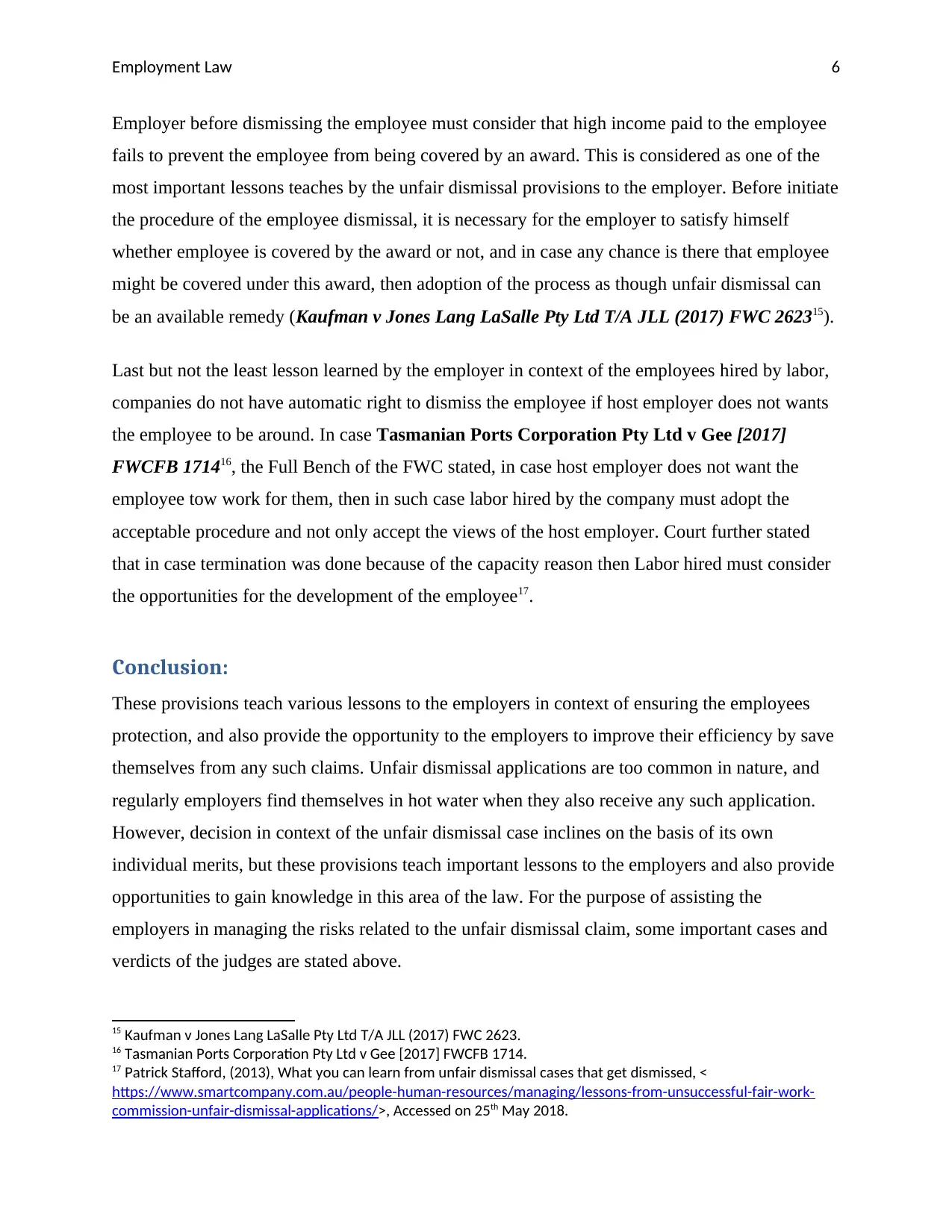
Employment Law 6
Employer before dismissing the employee must consider that high income paid to the employee
fails to prevent the employee from being covered by an award. This is considered as one of the
most important lessons teaches by the unfair dismissal provisions to the employer. Before initiate
the procedure of the employee dismissal, it is necessary for the employer to satisfy himself
whether employee is covered by the award or not, and in case any chance is there that employee
might be covered under this award, then adoption of the process as though unfair dismissal can
be an available remedy (Kaufman v Jones Lang LaSalle Pty Ltd T/A JLL (2017) FWC 262315).
Last but not the least lesson learned by the employer in context of the employees hired by labor,
companies do not have automatic right to dismiss the employee if host employer does not wants
the employee to be around. In case Tasmanian Ports Corporation Pty Ltd v Gee [2017]
FWCFB 171416, the Full Bench of the FWC stated, in case host employer does not want the
employee tow work for them, then in such case labor hired by the company must adopt the
acceptable procedure and not only accept the views of the host employer. Court further stated
that in case termination was done because of the capacity reason then Labor hired must consider
the opportunities for the development of the employee17.
Conclusion:
These provisions teach various lessons to the employers in context of ensuring the employees
protection, and also provide the opportunity to the employers to improve their efficiency by save
themselves from any such claims. Unfair dismissal applications are too common in nature, and
regularly employers find themselves in hot water when they also receive any such application.
However, decision in context of the unfair dismissal case inclines on the basis of its own
individual merits, but these provisions teach important lessons to the employers and also provide
opportunities to gain knowledge in this area of the law. For the purpose of assisting the
employers in managing the risks related to the unfair dismissal claim, some important cases and
verdicts of the judges are stated above.
15 Kaufman v Jones Lang LaSalle Pty Ltd T/A JLL (2017) FWC 2623.
16 Tasmanian Ports Corporation Pty Ltd v Gee [2017] FWCFB 1714.
17 Patrick Stafford, (2013), What you can learn from unfair dismissal cases that get dismissed, <
https://www.smartcompany.com.au/people-human-resources/managing/lessons-from-unsuccessful-fair-work-
commission-unfair-dismissal-applications/>, Accessed on 25th May 2018.
Employer before dismissing the employee must consider that high income paid to the employee
fails to prevent the employee from being covered by an award. This is considered as one of the
most important lessons teaches by the unfair dismissal provisions to the employer. Before initiate
the procedure of the employee dismissal, it is necessary for the employer to satisfy himself
whether employee is covered by the award or not, and in case any chance is there that employee
might be covered under this award, then adoption of the process as though unfair dismissal can
be an available remedy (Kaufman v Jones Lang LaSalle Pty Ltd T/A JLL (2017) FWC 262315).
Last but not the least lesson learned by the employer in context of the employees hired by labor,
companies do not have automatic right to dismiss the employee if host employer does not wants
the employee to be around. In case Tasmanian Ports Corporation Pty Ltd v Gee [2017]
FWCFB 171416, the Full Bench of the FWC stated, in case host employer does not want the
employee tow work for them, then in such case labor hired by the company must adopt the
acceptable procedure and not only accept the views of the host employer. Court further stated
that in case termination was done because of the capacity reason then Labor hired must consider
the opportunities for the development of the employee17.
Conclusion:
These provisions teach various lessons to the employers in context of ensuring the employees
protection, and also provide the opportunity to the employers to improve their efficiency by save
themselves from any such claims. Unfair dismissal applications are too common in nature, and
regularly employers find themselves in hot water when they also receive any such application.
However, decision in context of the unfair dismissal case inclines on the basis of its own
individual merits, but these provisions teach important lessons to the employers and also provide
opportunities to gain knowledge in this area of the law. For the purpose of assisting the
employers in managing the risks related to the unfair dismissal claim, some important cases and
verdicts of the judges are stated above.
15 Kaufman v Jones Lang LaSalle Pty Ltd T/A JLL (2017) FWC 2623.
16 Tasmanian Ports Corporation Pty Ltd v Gee [2017] FWCFB 1714.
17 Patrick Stafford, (2013), What you can learn from unfair dismissal cases that get dismissed, <
https://www.smartcompany.com.au/people-human-resources/managing/lessons-from-unsuccessful-fair-work-
commission-unfair-dismissal-applications/>, Accessed on 25th May 2018.
⊘ This is a preview!⊘
Do you want full access?
Subscribe today to unlock all pages.

Trusted by 1+ million students worldwide
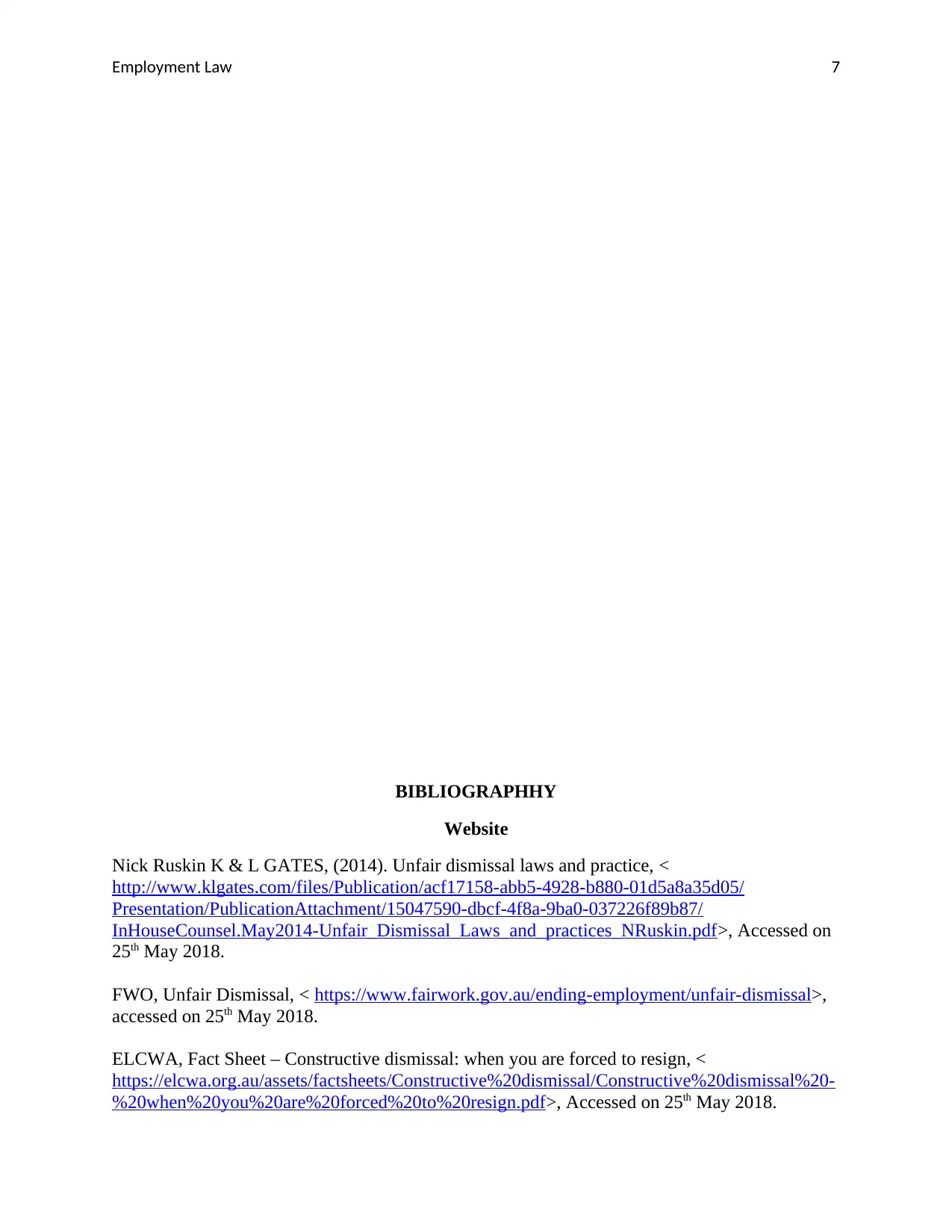
Employment Law 7
BIBLIOGRAPHHY
Website
Nick Ruskin K & L GATES, (2014). Unfair dismissal laws and practice, <
http://www.klgates.com/files/Publication/acf17158-abb5-4928-b880-01d5a8a35d05/
Presentation/PublicationAttachment/15047590-dbcf-4f8a-9ba0-037226f89b87/
InHouseCounsel.May2014-Unfair_Dismissal_Laws_and_practices_NRuskin.pdf>, Accessed on
25th May 2018.
FWO, Unfair Dismissal, < https://www.fairwork.gov.au/ending-employment/unfair-dismissal>,
accessed on 25th May 2018.
ELCWA, Fact Sheet – Constructive dismissal: when you are forced to resign, <
https://elcwa.org.au/assets/factsheets/Constructive%20dismissal/Constructive%20dismissal%20-
%20when%20you%20are%20forced%20to%20resign.pdf>, Accessed on 25th May 2018.
BIBLIOGRAPHHY
Website
Nick Ruskin K & L GATES, (2014). Unfair dismissal laws and practice, <
http://www.klgates.com/files/Publication/acf17158-abb5-4928-b880-01d5a8a35d05/
Presentation/PublicationAttachment/15047590-dbcf-4f8a-9ba0-037226f89b87/
InHouseCounsel.May2014-Unfair_Dismissal_Laws_and_practices_NRuskin.pdf>, Accessed on
25th May 2018.
FWO, Unfair Dismissal, < https://www.fairwork.gov.au/ending-employment/unfair-dismissal>,
accessed on 25th May 2018.
ELCWA, Fact Sheet – Constructive dismissal: when you are forced to resign, <
https://elcwa.org.au/assets/factsheets/Constructive%20dismissal/Constructive%20dismissal%20-
%20when%20you%20are%20forced%20to%20resign.pdf>, Accessed on 25th May 2018.
Paraphrase This Document
Need a fresh take? Get an instant paraphrase of this document with our AI Paraphraser
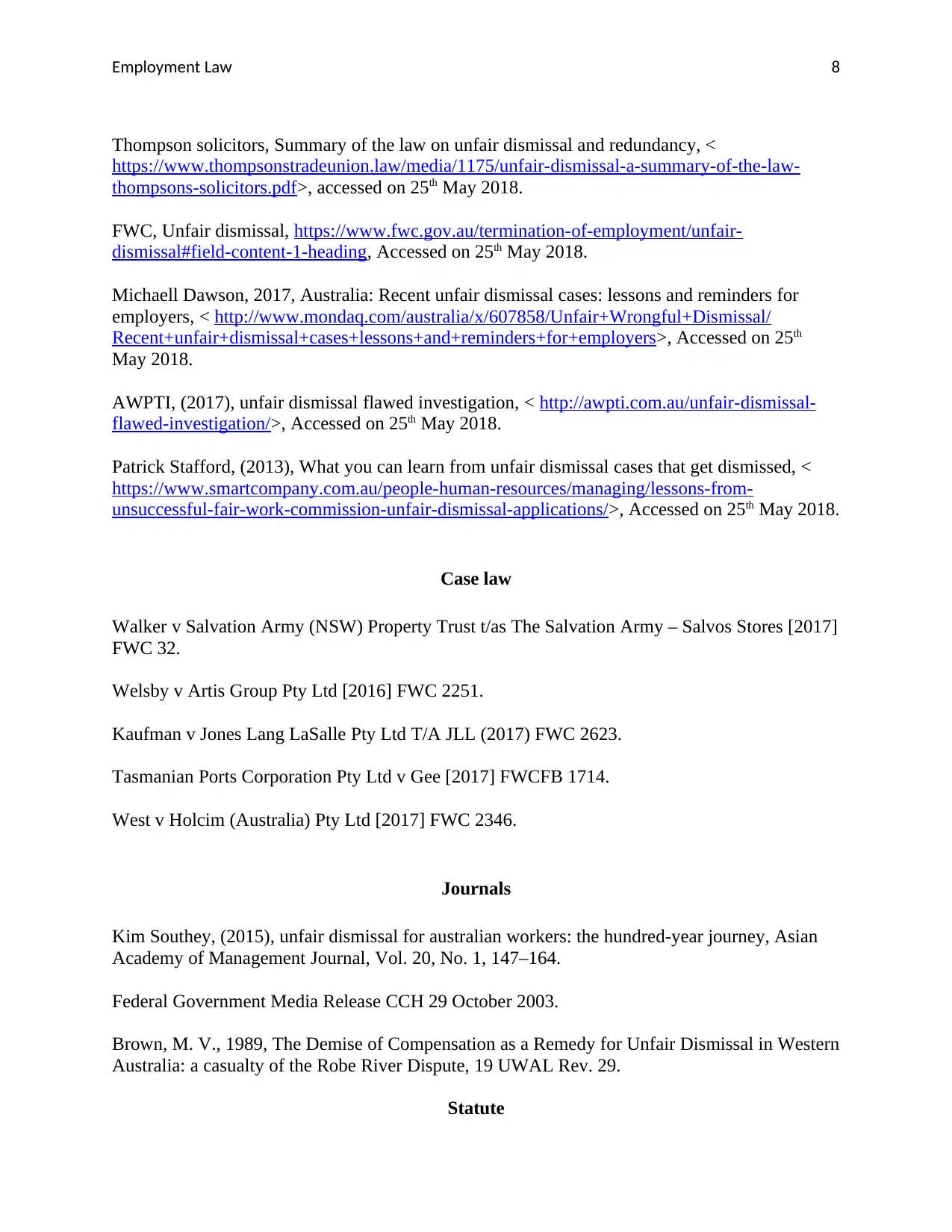
Employment Law 8
Thompson solicitors, Summary of the law on unfair dismissal and redundancy, <
https://www.thompsonstradeunion.law/media/1175/unfair-dismissal-a-summary-of-the-law-
thompsons-solicitors.pdf>, accessed on 25th May 2018.
FWC, Unfair dismissal, https://www.fwc.gov.au/termination-of-employment/unfair-
dismissal#field-content-1-heading, Accessed on 25th May 2018.
Michaell Dawson, 2017, Australia: Recent unfair dismissal cases: lessons and reminders for
employers, < http://www.mondaq.com/australia/x/607858/Unfair+Wrongful+Dismissal/
Recent+unfair+dismissal+cases+lessons+and+reminders+for+employers>, Accessed on 25th
May 2018.
AWPTI, (2017), unfair dismissal flawed investigation, < http://awpti.com.au/unfair-dismissal-
flawed-investigation/>, Accessed on 25th May 2018.
Patrick Stafford, (2013), What you can learn from unfair dismissal cases that get dismissed, <
https://www.smartcompany.com.au/people-human-resources/managing/lessons-from-
unsuccessful-fair-work-commission-unfair-dismissal-applications/>, Accessed on 25th May 2018.
Case law
Walker v Salvation Army (NSW) Property Trust t/as The Salvation Army – Salvos Stores [2017]
FWC 32.
Welsby v Artis Group Pty Ltd [2016] FWC 2251.
Kaufman v Jones Lang LaSalle Pty Ltd T/A JLL (2017) FWC 2623.
Tasmanian Ports Corporation Pty Ltd v Gee [2017] FWCFB 1714.
West v Holcim (Australia) Pty Ltd [2017] FWC 2346.
Journals
Kim Southey, (2015), unfair dismissal for australian workers: the hundred-year journey, Asian
Academy of Management Journal, Vol. 20, No. 1, 147–164.
Federal Government Media Release CCH 29 October 2003.
Brown, M. V., 1989, The Demise of Compensation as a Remedy for Unfair Dismissal in Western
Australia: a casualty of the Robe River Dispute, 19 UWAL Rev. 29.
Statute
Thompson solicitors, Summary of the law on unfair dismissal and redundancy, <
https://www.thompsonstradeunion.law/media/1175/unfair-dismissal-a-summary-of-the-law-
thompsons-solicitors.pdf>, accessed on 25th May 2018.
FWC, Unfair dismissal, https://www.fwc.gov.au/termination-of-employment/unfair-
dismissal#field-content-1-heading, Accessed on 25th May 2018.
Michaell Dawson, 2017, Australia: Recent unfair dismissal cases: lessons and reminders for
employers, < http://www.mondaq.com/australia/x/607858/Unfair+Wrongful+Dismissal/
Recent+unfair+dismissal+cases+lessons+and+reminders+for+employers>, Accessed on 25th
May 2018.
AWPTI, (2017), unfair dismissal flawed investigation, < http://awpti.com.au/unfair-dismissal-
flawed-investigation/>, Accessed on 25th May 2018.
Patrick Stafford, (2013), What you can learn from unfair dismissal cases that get dismissed, <
https://www.smartcompany.com.au/people-human-resources/managing/lessons-from-
unsuccessful-fair-work-commission-unfair-dismissal-applications/>, Accessed on 25th May 2018.
Case law
Walker v Salvation Army (NSW) Property Trust t/as The Salvation Army – Salvos Stores [2017]
FWC 32.
Welsby v Artis Group Pty Ltd [2016] FWC 2251.
Kaufman v Jones Lang LaSalle Pty Ltd T/A JLL (2017) FWC 2623.
Tasmanian Ports Corporation Pty Ltd v Gee [2017] FWCFB 1714.
West v Holcim (Australia) Pty Ltd [2017] FWC 2346.
Journals
Kim Southey, (2015), unfair dismissal for australian workers: the hundred-year journey, Asian
Academy of Management Journal, Vol. 20, No. 1, 147–164.
Federal Government Media Release CCH 29 October 2003.
Brown, M. V., 1989, The Demise of Compensation as a Remedy for Unfair Dismissal in Western
Australia: a casualty of the Robe River Dispute, 19 UWAL Rev. 29.
Statute

Employment Law 9
Fair work Act 2009.
Fair work Act 2009.
⊘ This is a preview!⊘
Do you want full access?
Subscribe today to unlock all pages.

Trusted by 1+ million students worldwide
1 out of 9
Related Documents
Your All-in-One AI-Powered Toolkit for Academic Success.
+13062052269
info@desklib.com
Available 24*7 on WhatsApp / Email
![[object Object]](/_next/static/media/star-bottom.7253800d.svg)
Unlock your academic potential
Copyright © 2020–2026 A2Z Services. All Rights Reserved. Developed and managed by ZUCOL.





